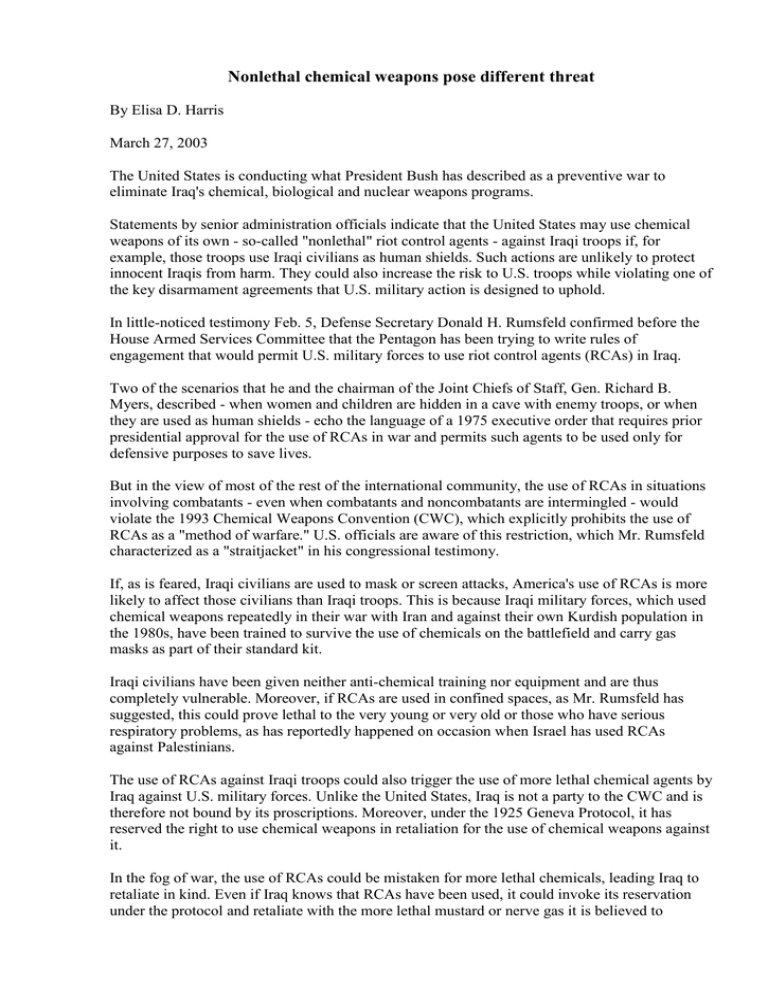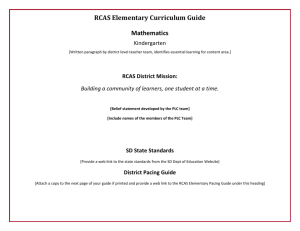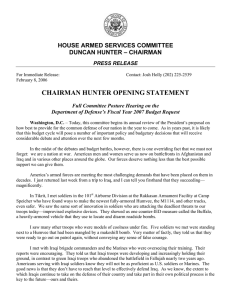nonlethal_chemical_weapons_pose_different_threat.doc (29.5Kb)
advertisement

Nonlethal chemical weapons pose different threat By Elisa D. Harris March 27, 2003 The United States is conducting what President Bush has described as a preventive war to eliminate Iraq's chemical, biological and nuclear weapons programs. Statements by senior administration officials indicate that the United States may use chemical weapons of its own - so-called "nonlethal" riot control agents - against Iraqi troops if, for example, those troops use Iraqi civilians as human shields. Such actions are unlikely to protect innocent Iraqis from harm. They could also increase the risk to U.S. troops while violating one of the key disarmament agreements that U.S. military action is designed to uphold. In little-noticed testimony Feb. 5, Defense Secretary Donald H. Rumsfeld confirmed before the House Armed Services Committee that the Pentagon has been trying to write rules of engagement that would permit U.S. military forces to use riot control agents (RCAs) in Iraq. Two of the scenarios that he and the chairman of the Joint Chiefs of Staff, Gen. Richard B. Myers, described - when women and children are hidden in a cave with enemy troops, or when they are used as human shields - echo the language of a 1975 executive order that requires prior presidential approval for the use of RCAs in war and permits such agents to be used only for defensive purposes to save lives. But in the view of most of the rest of the international community, the use of RCAs in situations involving combatants - even when combatants and noncombatants are intermingled - would violate the 1993 Chemical Weapons Convention (CWC), which explicitly prohibits the use of RCAs as a "method of warfare." U.S. officials are aware of this restriction, which Mr. Rumsfeld characterized as a "straitjacket" in his congressional testimony. If, as is feared, Iraqi civilians are used to mask or screen attacks, America's use of RCAs is more likely to affect those civilians than Iraqi troops. This is because Iraqi military forces, which used chemical weapons repeatedly in their war with Iran and against their own Kurdish population in the 1980s, have been trained to survive the use of chemicals on the battlefield and carry gas masks as part of their standard kit. Iraqi civilians have been given neither anti-chemical training nor equipment and are thus completely vulnerable. Moreover, if RCAs are used in confined spaces, as Mr. Rumsfeld has suggested, this could prove lethal to the very young or very old or those who have serious respiratory problems, as has reportedly happened on occasion when Israel has used RCAs against Palestinians. The use of RCAs against Iraqi troops could also trigger the use of more lethal chemical agents by Iraq against U.S. military forces. Unlike the United States, Iraq is not a party to the CWC and is therefore not bound by its proscriptions. Moreover, under the 1925 Geneva Protocol, it has reserved the right to use chemical weapons in retaliation for the use of chemical weapons against it. In the fog of war, the use of RCAs could be mistaken for more lethal chemicals, leading Iraq to retaliate in kind. Even if Iraq knows that RCAs have been used, it could invoke its reservation under the protocol and retaliate with the more lethal mustard or nerve gas it is believed to possess. Such escalation is not a mere theoretical possibility. Since World War I, every use of lethal chemical weapons on the battlefield has been preceded by the use of some type of nonlethal or riot control agent. The use of RCAs by U.S. forces could also expose those involved to charges that they have violated international law. The International Committee of the Red Cross has issued a statement reminding the world that the use of chemical agents - whether riot control or lethal - in warfare is prohibited under the CWC. Washington's only significant ally in the Iraq campaign, Britain, long has held a similar view, having blocked U.S. efforts at the end of the CWC negotiations to declare that all of the uses of RCAs outlined in the 1975 executive order were permitted under the treaty. Humanitarian, military and legal considerations argue against the use of RCAs in the unfolding war with Iraq. The United States should not undermine international proscriptions against chemical weapons by using RCAs or other toxic chemicals on the battlefield. Elisa D. Harris is a senior research scholar at the Center for International and Security Studies at the University of Maryland, College Park, and former director of nonproliferation and export controls for the National Security Council.






